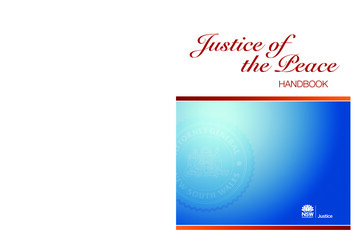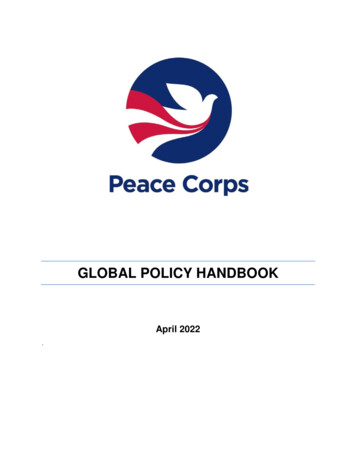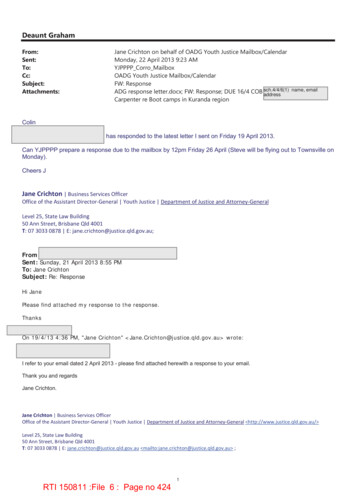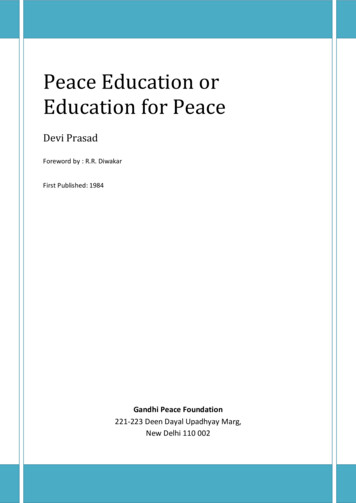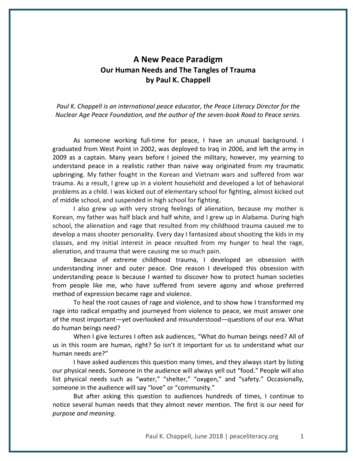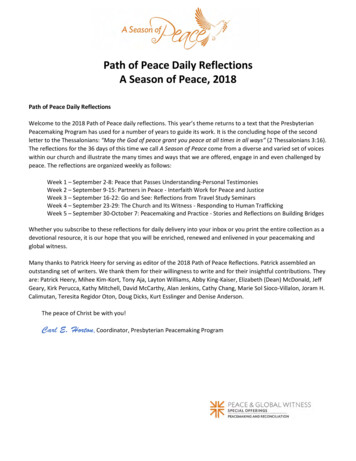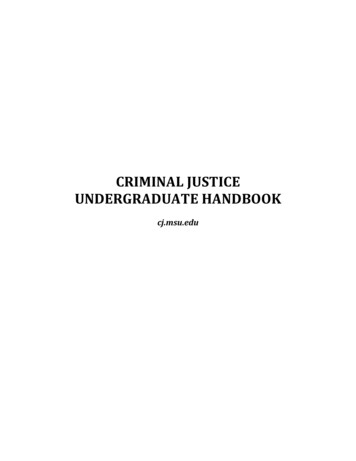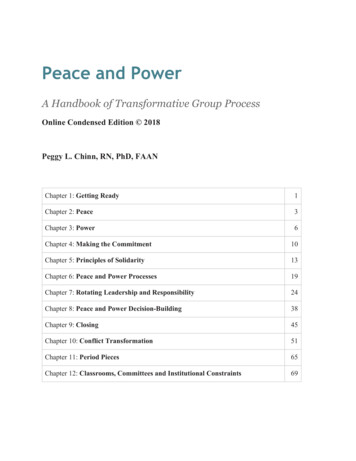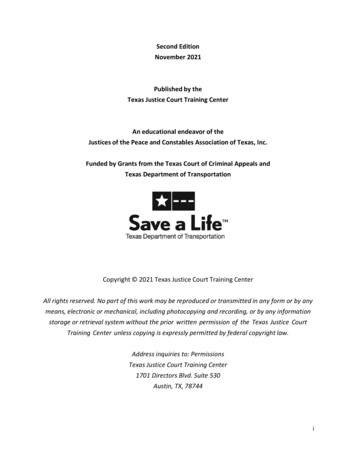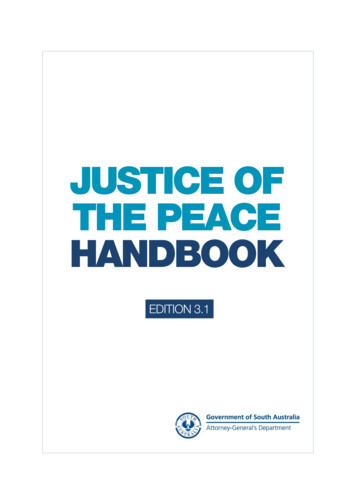
Transcription
JUSTICE OFTHE PEACEHANDBOOKEDITION 3.1
ACKNOWLEDGEMENTSThe information contained in this handbook has been sourced from many State andCommonwealth Government Departments and various other agencies. Justice of thePeace Services acknowledges the assistance and information from the followingorganisations in the preparation of this handbook: Aged Rights Advocacy Service Commonwealth Attorney-General’s Department Legal Services Commission of SA New South Wales Attorney-General’s Department Office of the Public Advocate Queensland Department of Justice and Attorney-General Royal Association of Justices of SA Inc SA Health SA Lands Titles Office SA Registry of Birth, Deaths and Marriages South Australian Civil and Administrative Tribunal Supreme Court of South Australia (Civil Registry) TAFE SAJustice of the Peace ServicesAttorney-General’s DepartmentPostal addressGPO Box 1351, Adelaide SA 5001Phone 131 882Emailjpservices@sa.gov.auWebsite www.agd.sa.gov.au This work is copyright. You may download, display, print and reproduce this material in whole or in part, subjectto acknowledgement of the source, for your personal use or use within your organisation but not for commercialuse. No part of it may be reproduced or distributed for profit or gain. Apart from any use permitted under theCopyright Act 1968 (Cth), all other rights are reserved.
DISCLAIMER FOR HANDBOOKThis is the third edition of the Justice of the Peace Handbook prepared by Justiceof the Peace Services of the Attorney-General’s Department of South Australia. Itis believed to be up to date at the time of publication. It is intended to assist JPs inunderstanding their role as a JP and their duties in witnessing various documents. Itis not to be used for the purposes of interpreting or applying legislation, court rules,practice directions, subordinate legislation or the like. It is not intended as a legaldocument. For legal advice the reader must seek advice from the legal profession.All reasonable care has been taken to provide accurate information; however, aslegislation may change there may be changes to the information contained in thispublication. Justice of the Peace Services will periodically update the information inthis Handbook and post on the website.The Justice of the Peace Handbook is free to download from the Attorney-General’sDepartment website www.agd.sa.gov.au.
CONTENTSSECTION 1INTRODUCTION .1Changing a child’s name. 41About this Handbook . 2Digital licenses. 45History of JPs in SA. 3Expiation notices. 46Support for JPs. 4Interstate or overseas documents. 48Consent to the marriage of a minor. 43Lands title documents. 49SECTION 2YOUR RESPONSIBILITIES,OBLIGATIONS & CONDUCTAS A JP.7Notice of intended marriage. 51Appointment conditions &responsibilities .8Statutory declarations. 61Use of the JP & JP Retired Titles. 10Waiver of rights. 67Complaints, Charges & Convictions. 12Other duties. 69Incapacity to carry out functionsof the Office and Resignation. 13JP stamps. 70Suspension and Removal. 14People with special needs. 52Powers of attorney. 58Verifying a person’s identity. 65Common questions. 71Notaries Public. 72Common Questions. 16SECTION 3YOUR ROLE & DUTIES AS A JP.18Introduction to witnessing documents . 19Advance care directives. 22Affidavits. 26Certifying copies. 38SECTION 4OTHER INFORMATION.74Commissioners for Taking Affidavits. 75Glossary. 76Useful Contacts. 77Code of Conduct for Justices ofthe Peace . 79
SECTION 1INTRODUCTIONJustice of the Peace Handbook1
ABOUT THIS HANDBOOKThe Justice of the PeaceHandbook (the Handbook)will help guide you inundertaking your duties asa Justice of the Peace (JP)with confidence.The Handbook has been developed byJustice of the Peace Services (JPS) and willhelp you understand your responsibilities andobligations under the Justices of the PeaceAct 2005 (the Act) and the Justices of thePeace Regulations 2021 (the Regulations).If you are asked to perform a duty that isnot covered in the Handbook or have anyquestions, please contact JPS on 131 882 oremail jpservices@sa.gov.au.The Handbook is available online at theAttorney-General’s Department websitewww.agd.sa.gov.au. It will be revisedperiodically with changes affecting yourfunctions as a JP.Please note this Handbook does not dealwith the duties of Special Justices.Justice of the Peace Handbook2
HISTORY OF JPS IN SAThe origin of JPs has beentraced back to Britain in1195, when King Richardthe Lionheart commissionedcertain knights to preservethe peace in unruly areas.They were responsible to theKing for ensuring that the lawwas upheld and they wereknown as Custodes Pacis(Keepers of the Peace). TheCustodes Pacis were theforefathers of JPs.During the early 1320s, Keepers of the Peacewere appointed in each county, and by the1340s these keepers had powers to hear anddetermine trespasses and punish offenders.The title ‘justice of the peace’ derives from1361 during the reign of Edward III, makingthe office one of the oldest in the commonlaw system.Over time, JPs in Britain were authorisedto perform functions ranging from hearingand determining offences to licensing publichouses. JPs in Australia today play a morelimited role and have little in common withtheir earlier British counterparts.JPs were recognised in the Australiancolonies from 1788 and after the settlementof SA in 1836, the first JP was appointedhere. Today there are over 7,000 JPs in SA.There are no national JPs in Australia. Eachstate and territory has its own legislation toregulate the appointment and powers of JPs.The functions of the office are different fromstate to state and witnessing requirementsalso differ between jurisdictions.SA JPs can witness documents whilst outsideSA if the document is to take effect in SA. Thisis the same as if the witnessing was done inSA, unless the law that governs the documentrequires it to be witnessed in the State.Justice of the Peace Handbook3
SUPPORT FOR JPSJustice of thePeace ServicesAttorney-General’sDepartment WebsiteJPS delivers a range of services to theSA community including managing theapplication, appointment, conduct andremoval of JPs and Special Justices(SJs) in accordance with the Act and theRegulations. JPS is part of the RegistrationBranch of Consumer and Business Services,a Department within the SA AttorneyGeneral’s Department.The website contains important informationfor JPs. The website address iswww.agd.sa.gov.au and you can accessthe JPS section by clicking in the box‘Services and Support’ and on the link‘Justice of the Peace’.JPS maintains the SA Roll of Justices a database containing contact informationfor JPs available around the state. The Roll ofJustices is accessible via the Attorney-General’sDepartment website www.agd.sa.gov.au. resources and formsJPS staff are available to: answer queries about how to become aJP or SJ assist members of the public to find a JP provide verification of JP IdentificationNumbers and whether a person is a JP provide support to JPs carrying out thefunctions of their office take complaints against JPs.JPS also manages the Attorney-General’sDepartment JP Volunteer Service whichprovides a witnessing service to the publicbetween 10am to 4pm Monday to Friday inthe central business district.In this section you will find: information relevant to your role information about the JPS Portal.The JPS Portal allows JPs to: update their contact and employment details update details which appear on the Roll ofJustices (the Roll) advise JPS of a change of name apply for suspension as a JP forpersonal reasons resign from being a JP apply for reappointment as a JP.If you do not have access to the JPS Portaland you are a current JP, please contact JPSon 131 882 or email jpservices@sa.gov.auInformation for the public about how tobecome a JP or where to find one is availableon the SA.GOV.AU website.JPS can be contacted on 131 882 or emailjpservices@sa.gov.au between 9am to4.30pm Monday to Friday.Justice of the Peace Handbook4
Royal Association of Justicesof South Australia Inc.The Royal Association of Justices of SouthAustralia Inc. (the Association) is a registerednot-for-profit association which supports itsmembers through education and training.JPs can apply to become members of theAssociation; however membership is notcompulsory and has no impact on yourappointment as a JP.The Association is located at Building 8,300 Richmond Road, Netley and canbe contacted on (08) 8297 4044Monday to Friday 10am-4pm or emailregistrar@rajsa.com.au.TrainingThe Royal Association of Justices of SA Inc.and TAFE SA provide training for JPs andsome other authorised witnesses. For moreinformation contact: Royal Association of Justices of SA Inc. (08) 8297 4044 or www.rajsa.asn.au TAFE SA - (08) 1800 882 661 orwww.tafesa.edu.au.Please note while we recommend training, itis not a prerequisite for applying to become aJP or to remain a JP in SA.Further information about the Association isavailable on their website www.rajsa.asn.au.Justice of the Peace Handbook5
NOTESJustice of the Peace Handbook6
SECTION 2YOURRESPONSIBILITIES,OBLIGATIONS &CONDUCT AS A JPJustice of the Peace Handbook7
APPOINTMENTCONDITIONS &RESPONSIBILITIESYour appointmentYour appointment as a JP is for a term ofup to 10 years. The date of the expiration ofyour appointment is stated on your Certificateof Appointment. Approximately five monthsprior to the expiration of your appointment,you will receive notification to commence thereappointment process through the JPS Portal.Your appointment is made under the Act andthe Regulations. You can access copies ofthe Act, the Regulations and the JP Code ofConduct on the website www.agd.sa.gov.auJPs holding office immediately before1 July 2006 (having been appointed under theformer legislation) were given the opportunityto apply for appointment under the Act.Pursuant to the transitional provisions inSchedule 1 of the Act, JPs who were notappointed under the Act during this process,ceased on 30 June 2020 by notice publishedin the SA Government Gazette by theAttorney-General.Responsibilities as a JPAs a JP you play an important role in helpingthe community and the legal system. Yourrole is to act as an independent and impartialwitness to documents people make for legalor official purposes. You have been appointedto this role because you are considered aperson of good character, reputation andstanding in the community. The public truststhat you are a person of integrity and honestyand that you will carry out your duties withcare and diligence.It is good practice to use the same procedureevery time you witness a document and werecommend you use the procedures setout in the Handbook unless a documenthas accompanying instructions. If you usea standard procedure you can describeconfidently how you witnessed a documentshould you be asked to give evidence in court.You should examine the document to checkit is in the correct format and to ensure youunderstand what is required by you. If thereare instructions you must read them carefullyand follow them to ensure you have carriedout your duties correctly.Incorrect witnessing of a document mayresult in the person suffering financial lossor other detriment. If you are unsure aboutthe document or what you are required todo, please contact JPS. If you are not ableto contact JPS, we suggest you decline towitness the document, explaining the reasonsyou are doing so and refer the person toanother JP who may have more experiencewith the type of document you are beingasked to witness. Alternatively you can offer tomake another time with the person after youhave been able to seek assistance.Justice of the Peace Handbook8
Oaths of Officebeing subject to any of the following:Following your appointment as a JP andbefore exercising any duties, you must takethe oath of allegiance and the judicial oathwithin three months after your appointment,as required by section 6 of the Oaths Act 1936. a control order under the Serious andOrganised Crime (Control) Act 2008The completed Oaths form must then bereturned to JPS so you can receive yourappointment package. Should you fail totake your Oaths within three months afteryour appointment under the Act, you maybe subject to disciplinary action which mayinclude suspension.Please note a JP is not authorised toadminister these Oaths.If you are reappointed for a further term andhave already taken the Oaths, you are notrequired to retake it.JP Code of ConductThe JP Code of Conduct (COC) is prescribedin the Regulations (Schedule 1) and all JPsare required to comply with it.You must notify JPS in writing within 14 daysof the following matters occurring: being charged with an offence (other thanan offence that is expiable) the charge of an offence (other than anoffence that is expiable) alleged to havebeen committed by you being withdrawn,dismissed or discontinued being convicted or acquitted of an offence(other than an offence that is expiable) being issued with an interim interventionorder or an intervention order under theIntervention Orders (Prevention of Abuse)Act 2009 being issued with an interim firearmsprohibition order or a firearms prohibitionorder under the Firearms Act 2015 a control order under Part 5.3 of theCriminal Code set out in the Scheduleto the Criminal Code Act 1995 ofthe Commonwealth, or a law of theCommonwealth that replaces that Code a control order under the Child SexOffenders Registration Act 2006 being diagnosed with a mental illnesswhere there are concerns the justice maycause harm to themselves, others orproperty- being convicted or acquitted ofan offence (other than an offence that isexpiable) being found to have acted dishonestlyby any court, tribunal, inquiry, regulatoryagency or complaint handling or disputeresolution body becoming bankrupt or applying as adebtor to take benefit of the laws relatingto bankruptcy being disqualified from managing orbeing involved in the management of anycompany under the Corporations Act2001 (Commonwealth).You must also notify JPS in writing if you areexpecting to leave the state or unable to carryout your duties for longer than three months.The Attorney-General or Delegate has thepower to take disciplinary action againsta JP if the JP breaches or fails to complywith the conditions of appointment or with aprescribed provision of the COC. Disciplinaryaction can include reprimand, suspension orfurther conditions may be imposed upon theappointment.A copy of the full COC is in Section 4 of thishandbook.Justice of the Peace Handbook9
USE OF THE JP &JP RETIRED TITLESUse of the title ‘JP’The title ‘JP’ must only be used whenperforming official functions as a JP and notwhen conducting business that does notrelate to your role. You must not use the initials‘JP’ when witnessing documents that donot require a JP to witness them. The COCcontains the following restrictions on the use ofoffice or the title JP:7— Restrictions on use of office or titleof justice1. A justice must not—(a) use, or seek to use, the office ofjustice of the peace for the purposeof advancing the justice’s business,commercial or personal interests; or(b) use, or seek to use, the title of justice ofthe peace for the purpose of advancingthe justice’s business or commercialinterest; or(c) use, or seek to use, the office or title ofjustice of the peace in a manner, or fora purpose, that may bring the office ofjustice of the peace into disrepute.You must also not use the title ‘JP’ toadvance your standing in the community,when providing written character referencesto support or promote family, friend orbusiness associates or when signingstatements or letters about personal matters.JPs can however use the JP title with theircontact details for the purpose of promotingtheir services as a JP. An example of this canbe on printed cards detailing their contactdetails so that people can contact them forJP services.It is an offence to use the title ‘JP’ when youare not entitled to do so. It is also an offenceto hold yourself out as a JP if you are not.Use of title ‘JP (Retired)’If you resign from office as a JP you mustcease performing official functions and usingthe title ‘JP’. If you resign as a JP you mayuse the title ‘JP (Retired)’ if: you served as a JP for at least 20 years you were not removed from office by theAttorney-General you have not been prohibited by theAttorney-General or Delegate to usethe title.The JP (Retired) title must be used withcaution and not to gain profit or to advancebusiness or commercial interests. Disciplinaryaction can be taken against a person whouses the title or any other title that suggeststhe person is a retired justice, in contraventionof a code of conduct.Payment for ServicesAs a JP you are a volunteer and it is in breachof the COC if you directly or indirectly solicitor accept any fees or reward from any personin connection with your office. This includesany gifts, gratuity, benefit or favour.It is however within your right to refuse towitness a document if it will result in youincurring any monetary costs.Justice of the Peace Handbook10
Changes to your details andthe Roll of JusticesYour details are recorded in the JP Systemmaintained by JPS. The JP System includesthe Roll of Justices (the Roll) which isaccessed by the public to find a JP.The Attorney-General is required by the Actto maintain the Roll and it is available to thepublic through the SA.GOV.AU website. It isimportant to have your current details on theRoll because members of the public use theRoll to find a JP in their local area.JPS will use your contact information toadvise you of: the latest information about the office of JPs any changes to the Act or Regulations information to help you carry out yourofficial duties accurately and appropriately.You must notify JPS in writing within 28 daysof any changes to: your name business or home addressThe Roll contains your: your contact telephone numbers(including mobile, home or business) or name your occupation. suburb telephone number available times languages spoken expiry date of your appointment whether you are a SJOther information the JP System holds, whichis not available to the public, includes your: residential and postal addressLogin to the JPS Portal to update yourinformation. If you change your name, youmust upload to the Portal a certified copy ofthe change of name document at the time ofsubmitting your change of name request. Thedocuments you can provide as evidence ofyour change of name are an official change ofname certificate, deed poll document or officialmarriage certificate (issued by Births, Deathsand Marriages, not the one provided to you onthe day of marriage by your celebrant). employment and occupation other information relating to your appointment.Justice of the Peace Handbook11
COMPLAINTS, CHARGES& CONVICTIONSComplaintsComplaints against JPs must be made inwriting and lodged with the JPS. There is anonline feedback and complaints form which isaccessible via www.sa.gov.au.JPS reviews all complaints made against JPsfor South Australia and considers whethera breach of the JP Code of Conduct mayhave occurred. If the information provided inthe complaint determines there is sufficientcause for concern, JPS can arrange for aninvestigation to ascertain whether there maybe any grounds for taking disciplinary actionagainst the JP.Types of complaints that will be considered are: JPs not complying with or breachingthe COC JPs not complying with or breaching theJustices of the Peace Act 2005 JPs not complying with a condition orrequirement of their appointment JPs who have been charged with orconvicted of offences JPs not carrying out the official functionsof the office correctly General misconduct of JPs that ifsubstantiated may result in bringing theoffice of a JP into disrepute.Trivial or vexatious complaints against a JPor personal disputes between a member ofthe public and a JP will not be considered.JPS follows a standard procedure inmanaging complaints about JPs. Howeverthe approach adopted to investigate andmanage complaints may vary depending onthe nature and seriousness of the complaintas well as the urgency of the issues arising inconnection with the complaint.The Act and Regulations provide that thefollowing disciplinary actions can be takenagainst a JP: formal reprimand imposing conditions on the JP’sappointment suspending the JP from officeJPS does not investigate or prosecutecriminal offences as criminal offending isgenerally a matter for the police.Charges and convictionsJPs are required to notify JPS in writing within14 days of being charged or convicted ofan offence (other than an expiable offence)and to notify of the withdrawal, dismissal ordiscontinuance of a charge of an offence.Disciplinary action may be taken against aJP for failing to notify within 14 days of beingcharged or convicted of an offence.JPS follows a standard procedure in handlingsituations when a JP is charged or convictedof an offence; however JPS will manage eachcase according to its circumstances.Justice of the Peace Handbook12
INCAPACITY TO CARRYOUT FUNCTIONS OF THEOFFICE AND RESIGNATIONIncapacity to carryout functionsResignationThe Act provides that if you become mentallyor physically incapable of carrying out officialfunctions satisfactorily, the Attorney-Generalmay remove you from office.You may resign from office at any time duringyour term of appointment or you can elect notto reapply when your term of office expires.Resignations must be made in writing andcan be submitted through the Portal.If you become unwell and can no longercarry out your official duties, you may beadvised to resign or apply for suspension forpersonal reasons. You can resign or apply forsuspension for personal reasons through theJPS Portal.After you have resigned from office as a JPyou cannot perform the functions of theoffice and your name and contact details willbe removed from the Roll of Justices. If at afuture stage you wish to resume JP functions,you will need to apply again.If you resign as a JP after having servedfor 20 years or more, you can use the tile‘JP (Retired)’ provided that you do not doso in contravention of the COC for RetiredJPs in Schedule 2 of the Regulations or incontravention of section 16(4) of the Act.If you move interstate or overseas permanentlyyou may wish to resign from your office ofJP. If you do not resign, your office of JPnevertheless becomes vacant because, byceasing to reside in South Australia, you are nolonger eligible for appointment as a JP. JPs areappointed under different Acts in each Stateand Territory.Justice of the Peace Handbook13
SUSPENSION ANDREMOVALSuspensionIf you are unable to perform your JP functionsfor a period of more than three months forpersonal reasons, it is recommended youseek suspension so that the public does notcontact you. Personal reasons include illness,family or business commitments or prolongedabsence from the state.Applications for suspension may be madethrough the JPS Portal.The Attorney-General or Delegate must besatisfied that personal reasons exist beforegiving written notice of your suspension fromoffice. The suspension can be for a specifiedperiod or until further notice, but cannotexceed two years. Upon suspension yourname is removed from the Roll of Justices.At the end of your suspension periodyour details will be reinstated on the Rollof Justices. You can ask to have yoursuspension revoked by the Attorney-Generalor Delegate if you are able to resume yourduties earlier. A suspension may be revokedby further notice.A JP whose office has been suspendedby reason of a prolonged absence fromthe State, must on or before the period ofsuspension expires, notify the AttorneyGeneral (which may be done through JPS)whether they intend to return to the Statewhen the period of suspension expires.Section 9(a)(iv) of the Act provides thatthe office of a JP becomes vacant if theJP ceases to satisfy the qualification byvirtue of which the member was eligible forappointment as a JP. Pursuant to section 4(8)of the Act, a person is not a ‘suitable person’for appointment under section 4(1) of theAct unless the person is an Australian citizenresident in South Australia. Should you notreturn to SA at the end of your suspension,you may prefer to resign as a JP pursuant tos9(a)(ii) of the Act.Under section 11 of the Act the AttorneyGeneral or Delegate may suspend you fromoffice if satisfied that there is proper causefor disciplinary action against you such asbreaching or failing to comply with the Act,the COC or a condition of your appointment.The suspension may be for a specifiedperiod or until you fulfil conditions set by theAttorney-General or Delegate, or until furthernotice, but will not exceed two years.Justice of the Peace Handbook14
RemovalA JP can be removed from office by theAttorney-General or Delegate by notice inthe SA Government Gazette for thefollowing reasons: is mentally or physically incapable ofcarrying out official functions satisfactorily is found guilty or convicted by a courtof an offence that, in the opinion of theAttorney-General shows the person to beunfit to hold office as a JP is bankrupt or applies to take the benefitof a law for the relief of bankrupt orinsolvent debtors should, in the Attorney-General’s opinion,be removed from office, for any other reason.If you are removed from office as a JP, youare not entitled to use the title ‘JP (Retired)’and you may not apply for reappointment asa JP for a period of five years from the dateof removal or such longer period as maybe specified by the Attorney-General in thenotice of removal.Justice of the Peace Handbook15
COMMON QUESTIONSAm I ineligible for jury service?Can a JP perform marriage ceremonies?Not necessarily. Only JPs who perform courtduties are ineligible for jury service (unlessyou are otherwise ineligible pursuant toSchedule 3 of the Juries Act 1927). If youare a JP who performs court duties, yourspouse or domestic partner will also beineligible for jury service.No. Only those authorised under the MarriageAct 1961 can.Must I disclose my contact detailsto JPS?Yes, you must provide all your contact detailsto JPS as required by the COC. However,only your name, nominated telephonenumber(s) and suburb or town in which youreside and/or work will be made available tothe public on the Roll of Justices. All otherpersonal details (such as your street address)are kept confidential.Do I have to conduct JP dutiesfrom home?No, you do not have to conduct your dutiesfrom home. You can arrange with the client tomeet at a mutually agreed location such as alibrary or shopping centre.Can I keep copies of documentsI witness?No, a JP must not keep copies of anydocuments they witness unless requiredby legislation.If you have concerns about a particulardocument you can record the documenttype, location of witnessing, the date andyour concerns about the document shouldany questions arise, but you must not keepany personal details about the person suchas their name, contact details or any numberson their documents.Can I provide legal advice?No. You must not give legal advice when youare performing duties as a JP, even if youhave legal knowledge. It is a breach of theCOC if you provide legal advice when actingin your capacity as a JP. If a person needslegal advice you can refer them to the LegalServices Commission on 1300 366 424 or youcan suggest they seek their own legal advice.Do I have legal protection?Section 15 of the Act provides that ‘a JP incursno civil or criminal liability for an honest act oromission in carrying out or purportedly carryingout official functions’ (emphasis added).You have a legal responsibility to adhereto your statutory duties and to follow therequisite procedures when performingfunctions as a JP. If you do not follow therequired procedures, you could cause a clientto suffer financial detriment or other lossand you risk having other legal action takenagainst you.If you perform a function you know is not theduty of a JP, the immunity offered under theAct may not apply. You should ensure youfollow the correct procedures and seek helpor refrain from witnessing a document if youare unsure of how to do it correctly.Justice of the Peace Handbook16
NOTESJustice of the Peace Handbook17
SECTION 3YOUR ROLE &DUTIES AS A JPJustice of the Peace Handbook18
INTRODUCTION TOWITNESSING DOCUMENTSYour main role as a JP is toact as an independent andobjective witness to documentspeople use for official or legalpurposes. As a JP yo
(Keepers of the Peace). The Custodes Pacis were the forefathers of JPs. During the early 1320s, Keepers of the Peace were appointed in each county, and by the 1340s these keepers had powers to hear and determine trespasses and punish offenders. The title 'justice of the peace' derives from 1361 during the reign of Edward III, making
